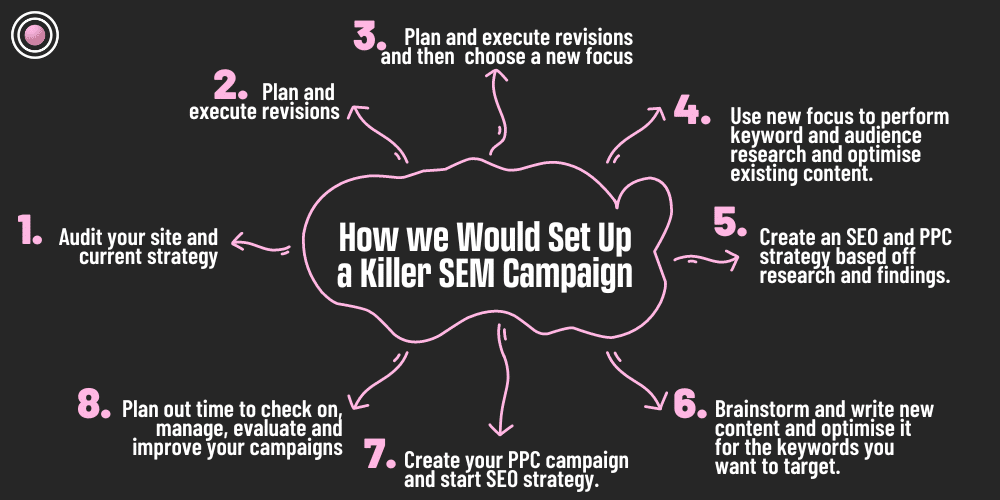
-
ROAR
- 4 Min Read
- Blog, Content Creation, PPC, Search Engine Marketing, SEO
Strategies for a Killer SEM Campaign That Gets Results
Results. They’re the reason you do it. To maximise your ROI, increase your traffic, and see more conversions. Your marketing strategy aims to achieve something positive for a business.
Plus, a severe lack of results will eventually attract targeted questions from partners, colleagues and clients alike.
Research says 43.2% of internet users aged 16 to 64 use it to primarily research products and brands.
In this blog, we will show you how to run a killer SEM campaign that creates results.
Before we jump in, remember to download your free guide to working with a search engine marketing agency.
What is a Search Engine Marketing Campaign?
A search engine marketing (SEM – you can find our blog demystifying digital marketing acronyms here) campaign comprises a digital marketing strategy and channels that aim to help a business’s website and content rank higher in search engines. It prioritises well-known digital strategies like PPC and SEO.
How to Run a Killer SEM Campaign
Your first step towards creating a killer SEM campaign is establishing the elements of one. These elements will need to be worked on, developed and improved. This can include your SEO, website, social media presence, paid search ads and content.
Let’s break this down element by element and investigate its effects on SEM campaigns.
SEO
There is no SEM campaign without an SEO strategy, and that is a fact. SEO is one of if not the most crucial parts of a business’s online marketing campaign and presence. SEO means optimisng your website to impact how a search engine portrays it. Then the search engines will determine where it should rank online.
This can include on-page SEO like utilising alt text and optimising your content with your competitive keyword of choice. It also contains off-page SEO, all of the bits you don’t necessarily see when visiting a website. Think of the UX (user experience) and the time it takes for your website to load.
Search engines like Google rank your website based on various factors associated with SEO. This means that poor SEO can have a negative impact on your position on the search engine results page (SERP).
It’s common knowledge that the search results on the first page of Google, receive a large portion of available website traffic. The first page of search results on Google tends to receive at least 71% of traffic. The first organic result in Google Search has an average click-through rate of 28.5%.
Don’t forget to check out our recent blog on 6 benefits of combining SEO and SEM.
Paid Search
Paid search or PPC could very well be SEO’s partner in crime. The fluidity of these two search marketing strategies is unmatched, and the results are endless. Paid search involves performing detailed keyword research. This looks into the search terms used by individuals most likely to require your product or services.
Bids are made on these terms using the allocated PPC budget. By bidding, you can appear in the ‘sponsored’ area of search results. This most commonly is at the top of the results pages.
Paid search is used to appear on the first page of search engines instantly. Unlike SEO, PPC is known to show immediate results and begin improving traffic. SEO involves some waiting around to climb the rankings.
Content
Content is king – never forget it. Many people forget about content regarding their more comprehensive strategy, but it is critical when launching a search engine marketing campaign.
Content contributes to SEO in a few ways; it allows you to target a lot of keywords at once. This means your website can attempt to rank for several different search terms and queries on search engines if optimised correctly.
Amongst keyword targeting, it reinforces your commitment to other ranking factors. These include creating fresh, helpful target audience-focused content like the Google Helpful Content Update. Content can also attract better backlinks, and give you a higher number of indexed pages.
Social Media
Social media doesn’t directly effect the way your search engine marketing campaign runs. However, it would be best if you didn’t entirely disregard its power. Sharing links across social media platforms has benefits, including brand exposure which can influence SEM and SEO.
Social media indirectly affects your business’s search visibility and organic search results. These can include social metrics and signals. A metric in this instance would be engagement in the form of likes, engagement and shares. These engagement metrics can allow you to evaluate trust, customer loyalty and brand awareness.
Social media can contribute to securing traffic and increasing visibility. This is by elevating your presence across social media platforms and pointing users to your website through them.
How We Would Set Up a Killer SEM Campaign Using the Above
- Run a website audit that thoroughly dissects the current website, including SEO and PPC. You can get a free SEO Audit and PPC Audit here.
- Plan and execute revisions to existing SEO and PPC campaigns before brainstorming the next focus.
- Use your next focus to perform keyword research for your SEM campaign (SEO+PPC), optimise existing content, and streamline any current PPC campaigns.
- Start brainstorming content you can write, and ensure some keyword research is carried out to ensure you’re targeting in-demand key terms. Get a complete content writing strategy from ROAR here. Then, start writing some. Top tip: use infographics and visuals and optimise them with your keyword in the alt text for an even stronger content strategy.
- Create your PPC campaign for your new focus based on in-depth keyword research,
- Plan out time each week to visit both your PPC and SEO strategy to manage it.
Kill the game with your next search engine marketing campaign with ROAR! We specialise in delivering tailored, results-driven strategies to improve online performance for businesses.






